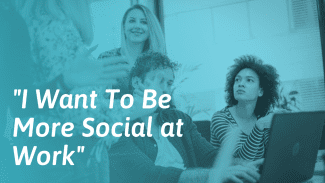“People at my job are really friendly with each other and spend a lot of time socializing. Because I’m an introvert, I don’t always feel like socializing at work, and even when I do, it’s awkward and uncomfortable. How can I get better at socializing with my colleagues while still being professional?”
Being friendly with coworkers can help make your job easier and more enjoyable, and being well-liked also helps you advance in your career.[1, 2, 3] Finding the line between being friendly and being professional can be difficult, especially because it can vary depending on where you work, who you work with, and what your role is.
For some people, it’s important to keep their personal life separate from work, while others don’t mind mixing the two. This article will provide tips on how to be friendly and professional at the same time, even if you’re not interested in socializing at work for the sake of it. It also contains some steps to turn coworkers into friends.
1. Consult your employee handbook
Depending on where you work, there may be rules about socializing that are spelled out in your employee handbook. While most people don’t take the time to read their employee handbook, it’s important to do so, as breaking rules could have consequences or even cost you your job. Some of the common rules for employees include:
- No sexual relationships with your boss or supervisor
- Limited personal relationships between employees and supervisors
- An employee should not be supervised by someone they are related to
- Mandatory policies about disclosing when another employee is related to you
- Social media policies about what an employee is allowed/not allowed to post publicly
- No personal, romantic, or financial ties with customers
- No alcohol or drugs at company parties or events
- No discussions about religion or politics
- No bullying or gossiping about coworkers or bosses
2. Set professional boundaries
Professional boundaries are rules about what is OK and not OK to say and do at work, including how you should interact with your coworkers. While some boundaries are enforced by your company, it’s also important to determine what boundaries you want to have with your colleagues.
Boundaries often need to be more strict for people in management, public-facing roles, and in fields with a lot of regulations.[4] The specific boundaries you set are for you to decide, but they should protect your job and your reputation and also to help you keep your work and personal life separate.
Examples of workplace boundaries include:[4]
- Staying out of workplace drama and conflict
- No hugging or unwanted physical touch or contact
- Not asking people at work to answer overly personal or sensitive questions
- Not sharing personal information about clients with coworkers unless necessary
- Not bringing up controversial subjects at work
- Not talking badly or gossiping about your company, boss, or colleagues
- No lending or borrowing money with people at work
- Not sharing personal information that could damage your reputation or threaten your job
- No romantic or sexual relationships with colleagues, bosses, or clients
3. Keep your door open
If you have an office, try to keep the door open during the day, unless you are in a meeting or on a call. This way, your coworkers will feel more comfortable dropping in to talk, ask questions, or get your input. An open door sends a welcome message to people, while a closed door can deter them.
If you work in a shared space, come out of your cubicle throughout the day and turn to face people who stop by your desk. This is a good way to encourage visitors and small talk with coworkers throughout the day.
4. Create a teamwork culture
A teamwork culture is a workplace where people work collaboratively on projects and tasks instead of having each person work on their own. Even if you work independently, you can create a teamwork atmosphere by offering to help others, asking for their feedback, and coming together regularly to discuss ideas and projects.
If your company doesn’t have a strong teamwork culture, there are simple ways to change this. If you are in a leadership position, consider setting times for weekly meetings or brainstorm sessions. Even if employees work independently on projects, this provides a designated time and place for people to come together, share ideas, and solve problems.
5. Make time for friendly conversations
Even if your goal isn’t to make friends with your coworkers, it’s still important to be on friendly terms with them. Being friendly makes work more enjoyable for everyone and also helps employees feel engaged and invested in their work. There are many simple ways to create a friendly atmosphere with coworkers, including:
- Take breaks and lunches together: Taking breaks and lunches with your coworkers is a great way to socialize without interrupting work hours. Consider eating lunch in the break room or the kitchen, where people are more likely to stop by and chat. You could also invite coworkers to eat lunch or take a quick walk once or twice a week.
- Have fun: All work and no play doesn’t make for a happy work environment and also makes it hard for coworkers to form good relationships. Team building activities, icebreakers, and holiday parties are all great ways to get on friendlier terms with people at work.
- Make small talk: It’s important to make time for a little small talk with your coworkers. Stopping by their office to say hello or to ask how their week is going are easy ways to make small talk.
You might need to improve your people skills at work if you’re not naturally social.
6. Assume an unofficial title
In the office, certain people take on unofficial roles and titles. For example, someone at work may be the go-to person when the fax machine isn’t working, and another may be the unofficial party planner. Identify something you are naturally good at and find a way to use it to create your own unofficial title in the office. Once your title becomes known, coworkers are more likely to seek you out if they need help with this.
Examples of unofficial titles include:
- Designer: If you have an eye for design, you could offer your help in redecorating the office, choosing new furniture, or helping to create flyers and brochures.
- SME: A subject matter expert (SME) is someone who is sought out for their specialized knowledge on a certain product, topic, or task.
- Cheerleader: If you’re naturally energetic and upbeat, your unofficial role could be the office cheerleader, giving shoutouts to people in meetings when they’ve been working hard.
7. Keep conversations work-friendly
Understanding what topics are work-friendly and which could cause problems for you makes it easier to strike up conversations with your coworkers. Avoid topics that may be too personal, sensitive, or controversial, and pay attention to how people respond during a conversation. If someone seems embarrassed, can’t make eye contact, or gets defensive, you may want to shift to a more neutral topic. Below is a list of some work-friendly topics, as well as some you may want to avoid.
| Work-friendly topics | Topics you may want to avoid |
| Current projects at work, ideas, future plans | Religion, politics, and personal beliefs |
| Hobbies, interests, and activities | Crude humor or topics involving sex |
| TV, media, and pop culture | Gossip, conflict, and drama in the office |
| Professional development | Money or personal financial information |
| News in your industry, topics related to the field | Drugs, alcohol, and other illegal behavior |
| Restaurants and businesses in your community | Weight, dieting, body image, and appearance |
| Good news related to your work or personal life | Personal problems (divorce, health problems) |
8. Stay connected online
Many workplaces have internal message boards or platforms to communicate with coworkers. These forums can be a great way to communicate with coworkers about projects at work, but they can also be used to socialize. If your company uses Slack, Google Hangouts, or Teams, these can be great ways to stay connected, especially if you work remotely.
Here are some tips for communicating with coworkers online:
- Automate a fun weekly check-in thread with an engaging topic like “My most recent work-from-home fail” or a “TGIF” thread where people can post funny memes or comments
- Create an announcements channel where coworkers can vent or share their achievements
- Get to know your coworkers by creating channels for non-work topics like “shows I’m watching” or “my dream vacation”
- Use the polls feature to create functional or fun surveys for coworkers
- Use emojis and memes to add personality and fun to your posts
- Tag specific coworkers to give shoutouts or ask targeted questions
9. Attend work parties, socials, and events
If you’re struggling to socialize at work, you might dread parties, dinners, and other social events with coworkers. It can be more difficult when you know no one, are new, or when you have awkward coworkers. Conversations in the office tend to be more predictable than being in a more casual or relaxed setting.
Still, showing up at work events is an important way to show you are invested in your job. If you’re not a party person, this list of tips can help you survive social events with coworkers without embarrassing yourself or seeming antisocial:[6]
- Know your limit when it comes to alcohol, and don’t go over it
- Offer to be a designated driver to hold yourself accountable to the limit you set
- Set a goal to talk to a certain number of people before you leave the event
- Don’t be the first or last to leave unless you are setting up or cleaning up
- Be personable by making small talk, asking questions, and showing interest
- Smile, laugh and use humor to help break the ice and have fun
- Start side conversations with coworkers you feel more comfortable around
- Don’t feel like you need to be the life of the party if this doesn’t come naturally to you
- Review your boundary list to remind yourself what is off-limits
10. Go slowly when making friends with coworkers
There may be some situations where it is OK to make friends at work. As long as this doesn’t put your job or reputation at risk, work can be a good place to make friends. If you want to turn coworkers into friends, it’s best to start slowly instead of diving in headfirst. Start by spending more time together at work before taking your friendship outside of the office, and disclose personal information gradually. Over time, you can use these research-backed tips to get closer to your coworkers:[5]
- Spend more time together during working hours
- Find things in common with them
- Spend time together outside of work
- Talk about non-work topics
- Open up about personal topics
- Trust and confide in each other
- Bond over memories and inside jokes
- Express appreciation for the other person and their friendship
- Offer practical and emotional support during important life events
Common questions about socializing at work
Is it OK not to socialize at work?
The short answer to this question is usually no. With only a few exceptions, socializing at work should be considered a part of your job and will help you both personally and professionally.
Why is it important to socialize at work?
Because you spend a big part of your life at work, having a job you like improves your physical and mental health, your stress levels, and your self-esteem.[2] People who get along well with coworkers are more satisfied with their jobs, enjoy their work more, and are less likely to quit.[1]
How can socializing at work help my career?
Being well-liked improves your chances of being recognized for your work and is proven to lead to more positive performance reviews.[3] Having good relationships with people also helps you build a professional network, which can lead to more opportunities for growth and advancement in the future.
How should I interact with customers?
Be professional, polite, and make sure they are satisfied. Because most companies operate from a policy that “the customer is always right,” having positive interactions with customers can keep you out of trouble and gain you favor with management.
Final thoughts
Remember that being friendly and well-liked at work is important and will make work easier, more enjoyable, and less stressful. Being friendly with people you work with also helps you build a professional network.
If getting too friendly with coworkers could put your job or reputation at risk, you need to be careful about setting boundaries, being professional, and sticking to safe topics and polite exchanges. If the risk is low and you want to make friends at work, go slowly and gradually work up to spending more time together and opening up to them about more personal issues.



